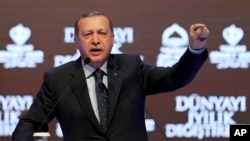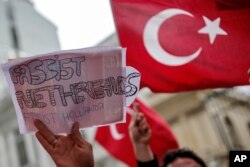Turkey's president continues to ratchet up tensions with the European Union, as he campaigns ahead of an April referendum to extend his presidential powers. The unprecedented rhetoric is raising concerns as to whether Turkish-EU relations can recover.
President Recep Tayyip Erdogan, having already accused EU members Germany and the Netherlands of being fascists and Nazis, has extended his war of words to the entire bloc.
Erdogan accused EU countries of persecuting Muslims like Jews were during World War II, and said that the “spirit of fascism” was running wild on the streets of Europe. In the meantime, his foreign minister, Mevlut Cavusoglu, warned that Europe will be the site of what he called “holy wars’ that will ultimately destroy it.
The comments follow a European Court of Human Rights ruling that businesses could ban their employees from wearing religious symbols including Islamic headscarves in certain circumstances. Political consultant Atilla Yesilada of Global Source Partners says the attacks on Europe are an attempt by Erdogan to consolidate nationalist and religious voters ahead of next month's referendum.
Big test for EU-Turkey relations
Yesilada warns that with opinions polls indicating the referendum is too close to call, EU-Turkish relations are set to face their greatest test.
“It’s the most crucial vote in [Erdogan’s] political career; if the whole idea is to bolster the vote for the yes camp, they need to invent new tricks to keep this fight going with the EU until mid-April because otherwise it will fade off, these shocks fade off in a week at most. What they will invent to further annoy Europe [with] above and beyond outrageous insults, I really don't know,” Yesilada said.
For now, Erdogan's attacks on Europe have only been confined to rhetoric. Despite repeated threats of sanctions against Germany and the Netherlands for banning Turkish ministers from speaking at rallies of ethnic Turks, until now there have only been few diplomatic measures.
Refugee deal at risk
Erdogan warned Thursday, however, that a key refugee deal with Europe could be at risk. Last year’s deal, which is marking its first anniversary, helped stem the mass influx of migrants into Europe.
Interior Minister Suleyman Soylu said 15,000 refugees a month should be sent to Europe as a shock therapy. Analysts suggest Ankara would be reluctant to end the refugee deal, it being key to maintaining relations with the EU, as well as an important leverage. Political columnist Semih Idiz of the Al Monitor website says the refugee deal will probably help prevent a severing of ties but warns relations may have been irreparably damaged.
“It’s going to take a lot of hard diplomacy to backtrack and to put things back on track; obviously for Europe, for its own interest, it will maintain things. But a wedge has been driven between the government in Turkey that represents Turkey at the moment and Europe, so it’s not going to be easy.”
With the outcome of the referendum in the balance - and with it, some claim, even the future of the president himself - observers say Erdogan and his government remain focused just on winning the vote, whatever the cost, which could mean more trouble for Europe-Turkey relations.





